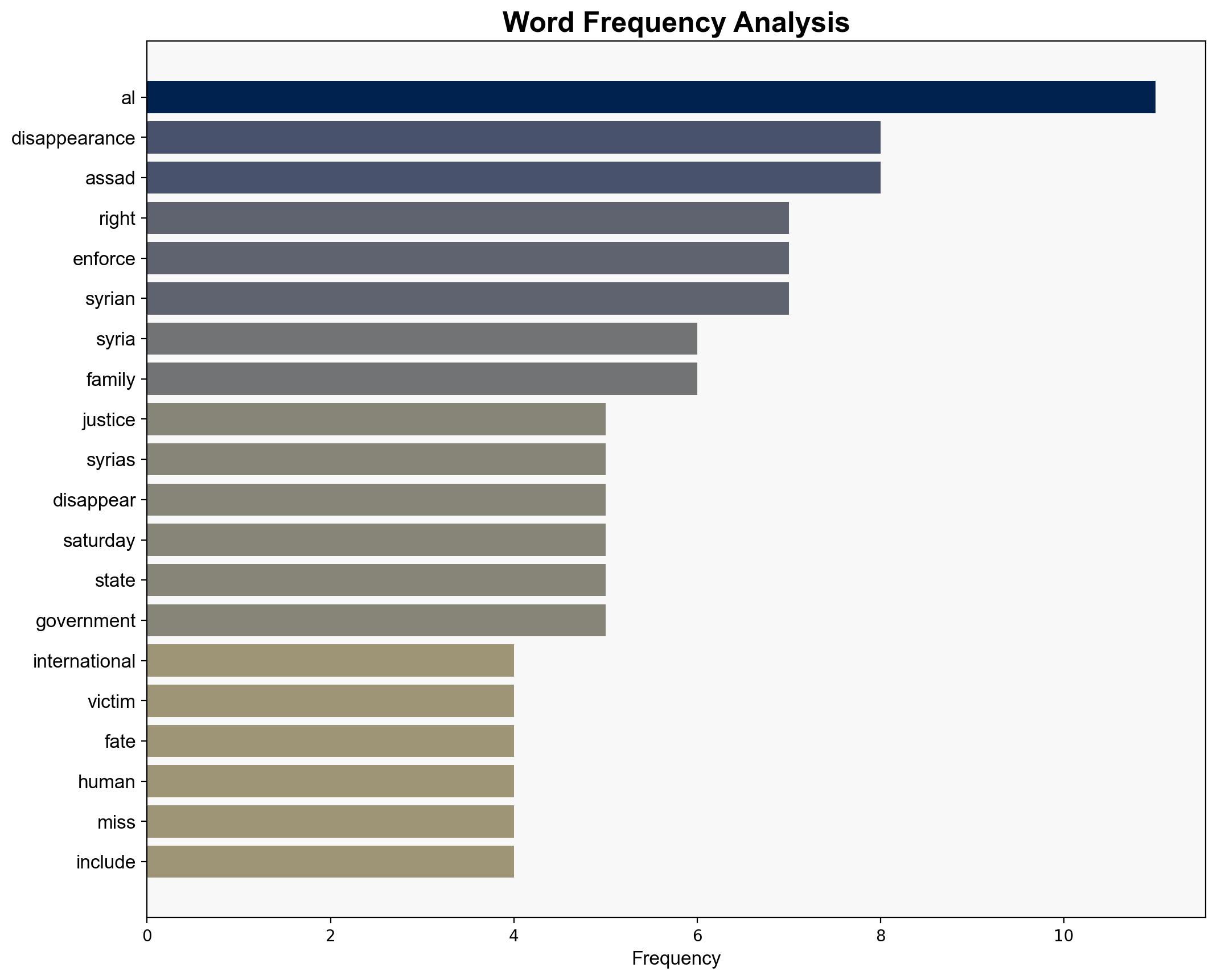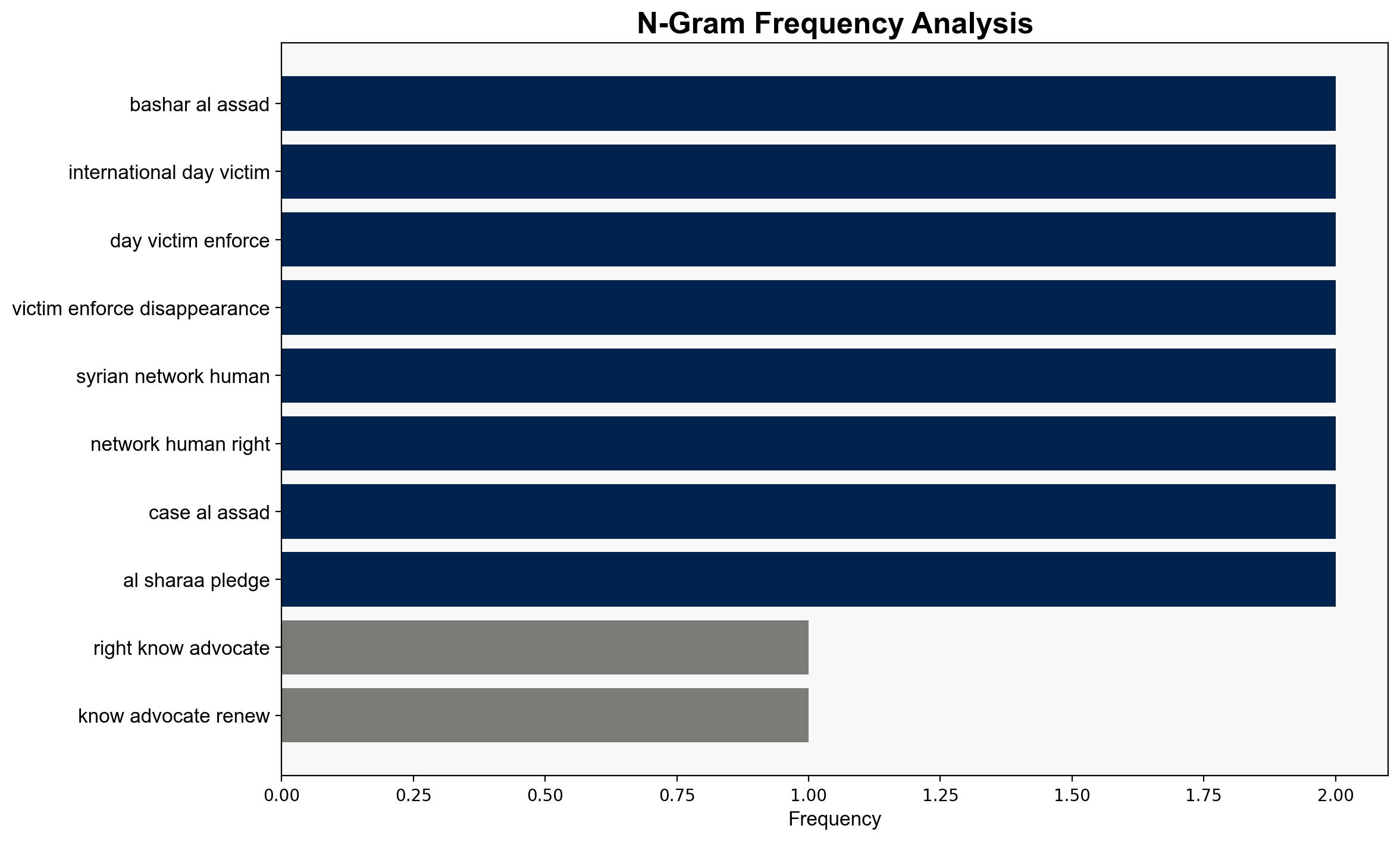Right to know Advocates renew calls for justice for Syrias disappeared – Al Jazeera English
Published on: 2025-08-30
Intelligence Report: Right to know Advocates renew calls for justice for Syria’s disappeared – Al Jazeera English
1. BLUF (Bottom Line Up Front)
The establishment of the National Commission for Missing Persons (NCMP) in Syria represents a potential shift towards addressing enforced disappearances, but its effectiveness is uncertain due to potential lack of independence and resources. The most supported hypothesis is that the NCMP will face significant challenges in achieving its objectives, given the entrenched interests and historical patterns of governance in Syria. Confidence level: Moderate. Recommended action: Monitor the NCMP’s progress closely and engage international bodies to ensure transparency and accountability.
2. Competing Hypotheses
1. **Hypothesis A**: The NCMP will effectively address the issue of enforced disappearances in Syria, leading to accountability and reconciliation.
– **Supporting Evidence**: The establishment of the NCMP and the pledge by interim president Ahmed al-Sharaa to address these issues.
– **Contradictory Evidence**: Historical lack of accountability and transparency in Syrian governance.
2. **Hypothesis B**: The NCMP will struggle to achieve its goals due to lack of independence, resources, and potential governmental interference.
– **Supporting Evidence**: Concerns raised by rights advocates about the need for independence and resources, historical patterns of governance.
– **Contradictory Evidence**: Initial steps taken by the Syrian government to establish the NCMP.
3. Key Assumptions and Red Flags
– **Assumptions**: The Syrian government is genuinely committed to resolving the issue of enforced disappearances. The NCMP will be granted the necessary resources and independence.
– **Red Flags**: Historical patterns of governmental control and lack of transparency. Potential bias in reporting and data from both government and advocacy groups.
– **Blind Spots**: Limited access to reliable data and firsthand accounts due to ongoing conflict and restricted media access.
4. Implications and Strategic Risks
– **Implications**: Failure of the NCMP could exacerbate tensions and hinder reconciliation efforts, potentially leading to further instability.
– **Strategic Risks**: Continued disappearances could fuel radicalization and recruitment by extremist groups. International criticism could lead to increased sanctions or diplomatic isolation.
– **Cascading Threats**: Potential for regional destabilization if the issue remains unresolved, affecting neighboring countries and refugee dynamics.
5. Recommendations and Outlook
- Engage with international organizations to provide oversight and support for the NCMP, ensuring transparency and accountability.
- Encourage diplomatic dialogue with Syrian authorities to prioritize the issue of enforced disappearances.
- Scenario Projections:
- Best Case: The NCMP operates independently and effectively, leading to significant progress in addressing disappearances.
- Worst Case: The NCMP is undermined by governmental interference, leading to increased tensions and instability.
- Most Likely: The NCMP makes limited progress due to resource constraints and political challenges.
6. Key Individuals and Entities
– Ahmed al-Sharaa
– Mohammad Reda Jalkhi
– Kristine Beckerle
– Syrian Network for Human Rights (SNHR)
– Amnesty International
– International Committee of the Red Cross (ICRC)
7. Thematic Tags
national security threats, human rights, regional stability, governance, international relations





